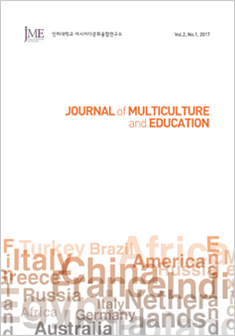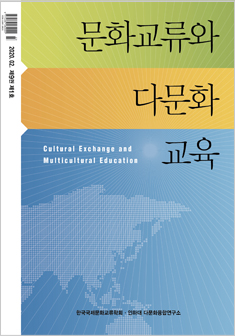
논문검색
HOME 학회지 논문검색
문화교류와 다문화교육, (2024)
pp.193~224
결혼이주여성강사의 교육경험을 통한 다문화리터러시 의미 탐색
본 연구의 목적은 다문화인식개선 체험프로그램 교육경험 연구로 결혼이주여성강 사의 교육 경험의 본질적 의미와 구조를 분석하여 미래 다문화교육의 시사점을 제시 하는 것이다. 연구 목적 달성을 위해 질적 연구 방법인 Colaizzi의 현상학적 연구방법 을 활용하여 연구를 진행하였다. 연구 참여자는 다문화인식개선 체험프로그램 강사의 직무를 수행하는 4명의 결혼이주여성으로 자료 수집은 심층면접 및 전화면담으로 이루어졌다. 연구결과 결혼이주여성 강사의 교육경험은 첫째 7개의 주제와 18개의 중심의미로 분류되었다. 둘째, 주제와 중심의미를 통해 찾을 수 있는 교육경험의 본질은 ‘문화차이 를 극복하고 다문화인식개선 체험프로그램 강사 되기’, ‘다양한 문화의 중재자 역할하 기’, ‘문화적 정체성을 찾아 진정한 한국인으로 거듭나기’ 과정으로 나타났다. 셋째 교육 경험의 이론적·실천적 시사점은 다문화 강사를 ‘문화자본’의 시점에서 볼 필요가 있고, 문화통합을 위한 문화학습과정이며, 다문화체험 교육을 통해 습득한 문화지식은 ‘문화 정체성’으로 귀결되어 ‘외국계 한국인’으로 통합되는 것을 확인하였다. 이러한 다문화 체험프로그램 교육경험의 의미는 결혼이주여성강사의 다문화리터러시 역량 강화를 위한 활용, 개발, 지원 등 환경조성의 필요성이다.
Exploring the Meaning of Multicultural Literacy through the Teaching Experiences of Married Immigrant Women Instructors
The purpose of this study is to analyze the intrinsic meaning and structure of the educational experience of married migrant women lecturers in a multicultural awareness improvement experience program and suggest implications for future multicultural education. To achieve the purpose of the study, Colaizz’s phenomenological research method, a qualitative research method, was utilized. The participants of the study were four married migrant women who perform the duties of instructors of a multicultural awareness improvement experience program, and the data were collected through in-depth interviews and telephone interviews. The results of the study showed that the educational experiences of the migrant women instructors were categorized into seven themes and 18 central meanings. Second, the essence of the educational experiences found through the themes and central meanings were ‘overcoming cultural differences and becoming an instructor of multicultural awareness improvement experience program’, ‘acting as a mediator between different cultures’, and ‘finding cultural identity and becoming a true Korean’. Third, the theoretical and practical implications of the educational experience were that multicultural instructors need to be viewed from the perspective of ‘cultural capital’, it is a cultural learning process for cultural integration, and cultural knowledge acquired through multicultural experience education leads to ‘cultural identity’ and integration into ‘foreign Koreans’. The implication of these educational experiences of multicultural experience programs is the need to create an environment such as utilization, development, and support to strengthen the multicultural literacy competencies of female lecturers.
 다문화와 교육(Journal of Multiculture and Education)
다문화와 교육(Journal of Multiculture and Education) 문화교류와 다문화교육
문화교류와 다문화교육